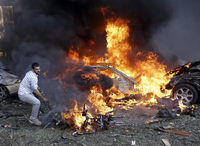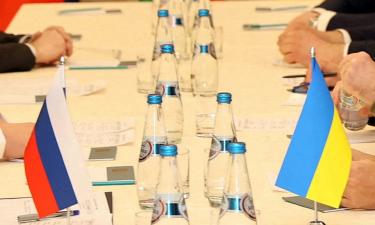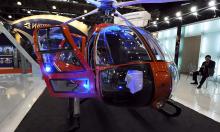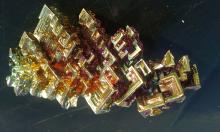Two massive explosions strike Iranian embassy in Beirut
Two massive explosions struck the Iranian embassy in south Beirut Tuesday morning; according to the Lebanese Minister of Health at least 23 people were killed including the cultural attaché at the embassy, Ebrahim Ansari and more than 150 wounded, but the number could rise. Several buildings near the embassy were also seriously damaged.

TV images showed flames rising from several vehicles, charred bodies on the streets and rubble from buildings. The explosions were caused by two bombs and not by rockets, as initially believed, but the dynamics are still unclear.
AP and the Hezbollah TV channel al-Manar quoted sources saying that the first blast was caused by a suicide bomber, while the second was a car bomb, a Renault Rapid loaded with 100kg of TNT, which did most of the damage.
Although security sources on the ground claimed that the first explosion was caused by a person on a motorbike, while the second was the result of a suicide bomber who tried to ram the compound with the car.
People present in the area of the attack reported that there were two minutes between both blasts.
Located in an area considered a stronghold of the Lebanese Shiite movement Hezbollah and home to many families of Iranian diplomats working in Lebanon, the embassy is considered to be one of most heavily guarded buildings in southern Lebanon, but that still did not grant immunity from the attack.
According to Ibrahim Sharqieh, a conflict resolution analyst at the Brookings Doha Center, the attack is closely linked to the situation in Syria: "Such a blast is expected. I believe it is closely related to what's happening in Syria and Iran has been identified as a major player in the Syrian conflict".
Lebanese Defense Minister Albert Mansour declared that an investigation was underway to identify the perpetrators of the attack and raised concerns about the possible consequences:
"These innocents were killed in an act of cold blooded terrorism.... This attack will add fuel to the fire of sectarianism in the country and hostility between Shiite and Sunni Muslims".
Nobody has yet claimed responsibility for the bombing but it is interesting to notice that the blasts occurred only 24 hours after a Syrian top jihadi leader, Abdelqader Saleh, military commander of the Liwaa al-Tawhid, was killed by government shelling in the northern city of Aleppo.
Liwaa al-Tawhid suffered major losses in recent weeks and the Syrian opposition accused Hizbullah and Iran of fighting on behalf of Assad. After government forces recaptured the strategic town of Safira on the outskirts of Aleppo earlier this month, Liwaa al-Tawhid and other factions declared a state of emergency.
Another element to keep in consideration is the fact that Saudi Arabia, already upset after the United States dropped the threat of military strikes in response to a poison gas attack in Damascus in August, is strongly worried by the ongoing nuclear talks that could lead to a broader rapprochement between Iran and the United States. The Saudi kingdom is concerned that better US-Iranian relations could upset the balance of power between the Sunni Gulf states and the Shia Islamic republic.
Saudi Arabia has often been accused by the Syrian government of supporting the al-Qaeda linked Sunni rebels fighting to overthrow Assad.
Giovanni Giacalone
Subscribe to Pravda.Ru Telegram channel, Facebook, RSS!



